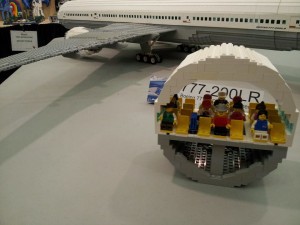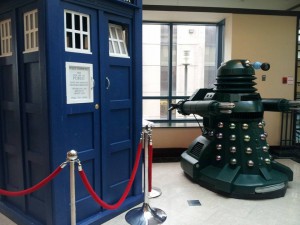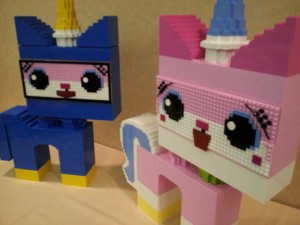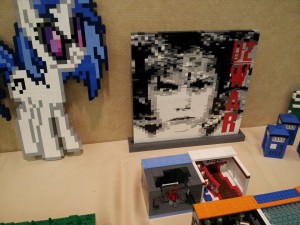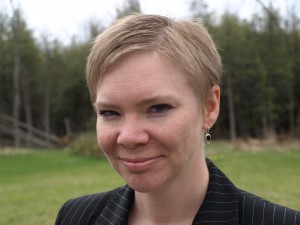written by David Steffen
I am back from WorldCon 74, also known as MidAmericon 2, which was held in Kansas City, Missouri from August 17-21! I am back into my normal swing of things and trying to work my way back into the normal everyday types of things that WorldCon wasn’t.
I had such an incredible time. Sitting at my desk, back in the real world, my brain is still trying to process everything, it has been a very densely packed 4 days. I am introvert. I use the word “introvert” in the sense, not that I hate social situations or hate people or anything like that, but that social situations use energy and being by myself recharges energy–as opposed to an extrovert who recharges by being around people and uses energy when they’re alone. I was expecting to have fun, but I was also expecting to slam into my social limits halfway through each day and then come home feeling like a wrung out washcloth. But, it seems that in this very specific environment, I am more of an extrovert–most nights when I finally retired to my room the reason was more because of aching legs and knowing that I should try to get some sleep than being unable to cope with the social scene anymore.
I arrived at the hotel around midday Thursday and left around midday Sunday, so I had a solid 72 hours around the premises. I hear there are a lot of really interesting things to go see in and around Kansas City. But I didn’t go to any of them, figuring that I had such a limited time here and the people and things I came here for were all concentrated in the area by the hotel and convention center.
The biggest difference in my convention experience between this time and the last time at WorldCon in Chicago in 2012 is that I have become somewhat more notable in the speculative fiction publishing community.
Since 2012:
–The Submission Grinder was launched.
–Diabolical Plots started publishing original fiction and became a SFWA-qualifying market.
–The Long List Anthology was published.
So the biggest difference is that it wasn’t uncommon for complete strangers to actually know of what I do. Some would recognize me from checking my name badge alone. Others wouldn’t recognize the name, but if I mentioned the Grinder or someone else mentioned that I run the Grinder then many writers would recognize me, would often say very nice things about the site. This was a very big difference for me–When I last attended a convention I had had some published fiction and had been running Diabolical Plots for nonfiction-only for 4 years , but those had never spurred this kind of reaction.
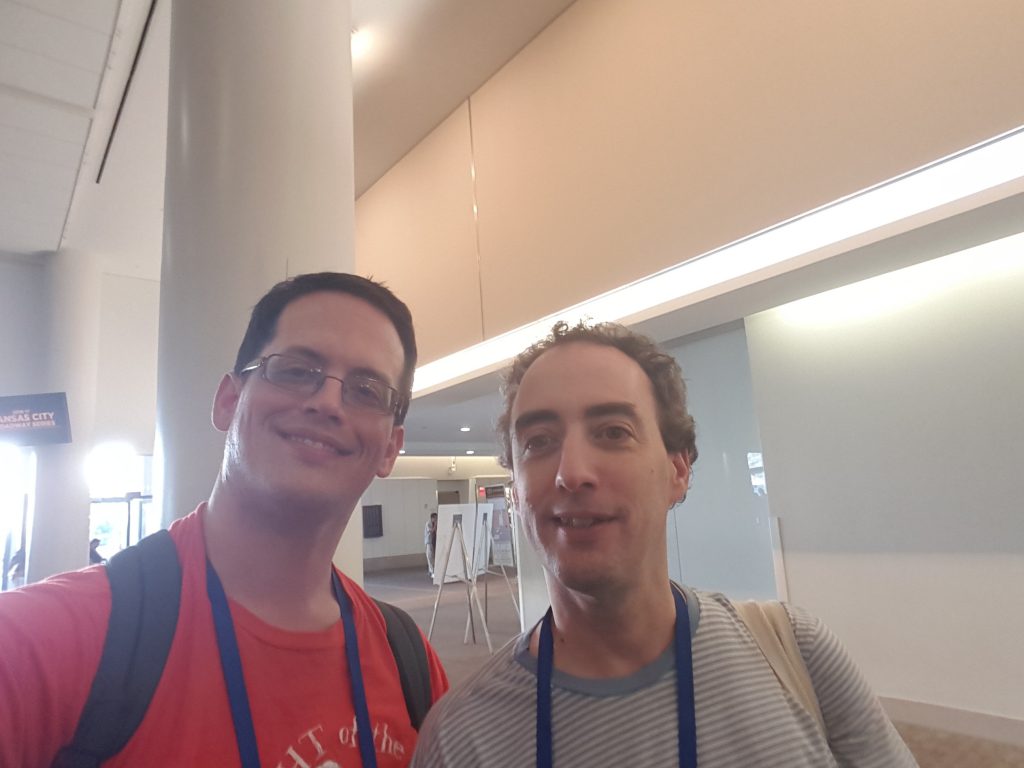
In the past, when I was just getting started at writing, I had some miserable experiences at conventions–I just thought they weren’t for me. I couldn’t seem to get anyone to really talk to me and whenever I tried I just felt like I was shut out by everyone there. This time around, since I was more well-connected than I’ve been in the past, I tried my best to try to help people have a good convention who looked like they might’ve been in the same boat as I had been when I’d had miserable conventions. First, if I was standing in a circle of people talking and I saw someone standing outside the circle looking like they wanted to join, I would try to step to one side and wave them in, make it clear they were welcome to join the conversation. Second, if I was with some people I knew, and I saw other people that I suspected didn’t know each other, I would try to introduce the two groups to each other, maybe with a bit of bragging-up, since it is much easier to talk about another person’s accomplishments than your own. I feel like these simple practices might’ve helped make the con a little better for some of these people, and I know that when I saw such similar behaviors directed toward me I greatly appreciated the person taking a moment to make my day much better.
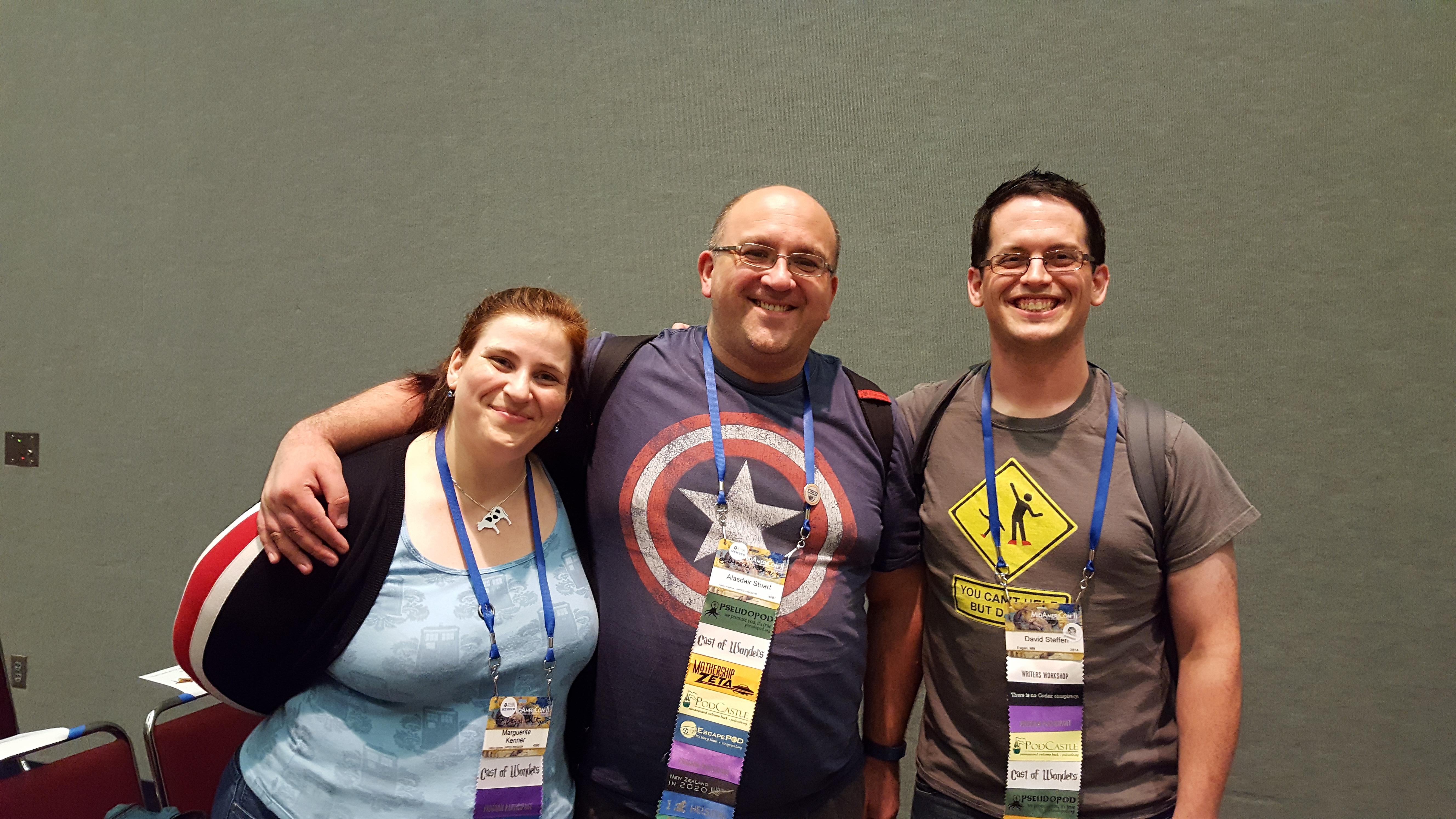
I was namedropped on at least three different panels, and each one was for a different project–this was a novel experience for me. I have heard secondhand from people who’ve gone to other conventions that the Submission Grinder is often mentioned in panels as a resource, which is great! I hear that I was mentioned in a Kickstarter panel as an example of someone who has run a successful Kickstarter (for the Long List Anthology last year)–this was before I arrived onsite or I might’ve been there myself. I hear that I was mentioned in a panel aimed at new writers that in part discussed the topic of how to find markets for your work, and the Submission Grinder was mentioned as a resource–I had intended to attend that panel just to see if I could witness a namedrop for the fun of it, but I ended up seeing a perfect opportunity to hang out with someone I had barely seen yet, so I took that opportunity (and didn’t regret it since my intent to visit the panel was really just a vanity novelty). And the one namedrop I was there to witness–Finding the Right Podcast For You, in which Alasdair Stuart mentioned the Diabolical Plots “Best Of” podcast list as a good way to get samplings of fiction podcasts… and then he also commented on the shades of pink I was cycling through. So that was all very exciting.
Aside: This might be an appropriate time to note that being able to have an unrelentingly wonderful time does not mean that everyone was treated well–see this thread by Alyssa Wong about being targeted by harassment at this convention and a previous one she had gone to. Alyssa had very positive things to say about how the WorldCon organizers handled it (which is good!) but it is horrible that it got as far as it did–people should know better. This isn’t rocket science. Read her thread and other threads that spun off of it if you aren’t aware of this kind of horrible behavior from some small subset of fans. It’s nasty stuff. I did not see any of this kind of thing happening personally, but it did happen. It’s not necessarily surprising that I didn’t see or experience it personally, since I am an able-bodied heterosexual white man of unremarkable appearance who is not a household name, and so it would be less usual for me to be the target of such abuse (not impossible, mind you, but less common). It is a mark of privilege that I don’t generally need to worry about that, and I’m glad that Alyssa Wong and others are willing to talk about this kind of thing still happening, because it’s easy for people who don’t experience it to forget about it or to think it’s not a problem if the people who ARE experiencing it feel like they can’t talk. On the other hand, since this is a post about my experience of the con, I will leave it at that for now–if you weren’t aware of that thing happening, consider taking some time to read her tweets. There have been some other tweet streams of interest on the subject of harassment that have run since WorldCon, such as this one by Rachael K. Jones and this one by Julia Rios.
My Programming
I wasn’t involved in a lot of programming. I actually hadn’t thought that I would be on any programming at all–I had applied early in the year and received a rejection quickly after. But I did end up being in two bits of programming.
Writer’s Workshop
I co-led a critique session with C.C. Finlay (editor of F&SF and a writer), which was a lot of fun. We read synopses and excerpts from novels by three authors, and then all five of us gave our impressions and we discussed ways that the synopses and excerpts might be improved. I had never met Finlay before, and it was wonderful to get a chance to not only meet with him but to interact with him for a couple hours to discuss strengths and weaknesses of fiction. Obviously I can’t say much more than that–these were unpublished novels and the discussion in a private room, so I can only speak about it in generalities.
Fiction Reading
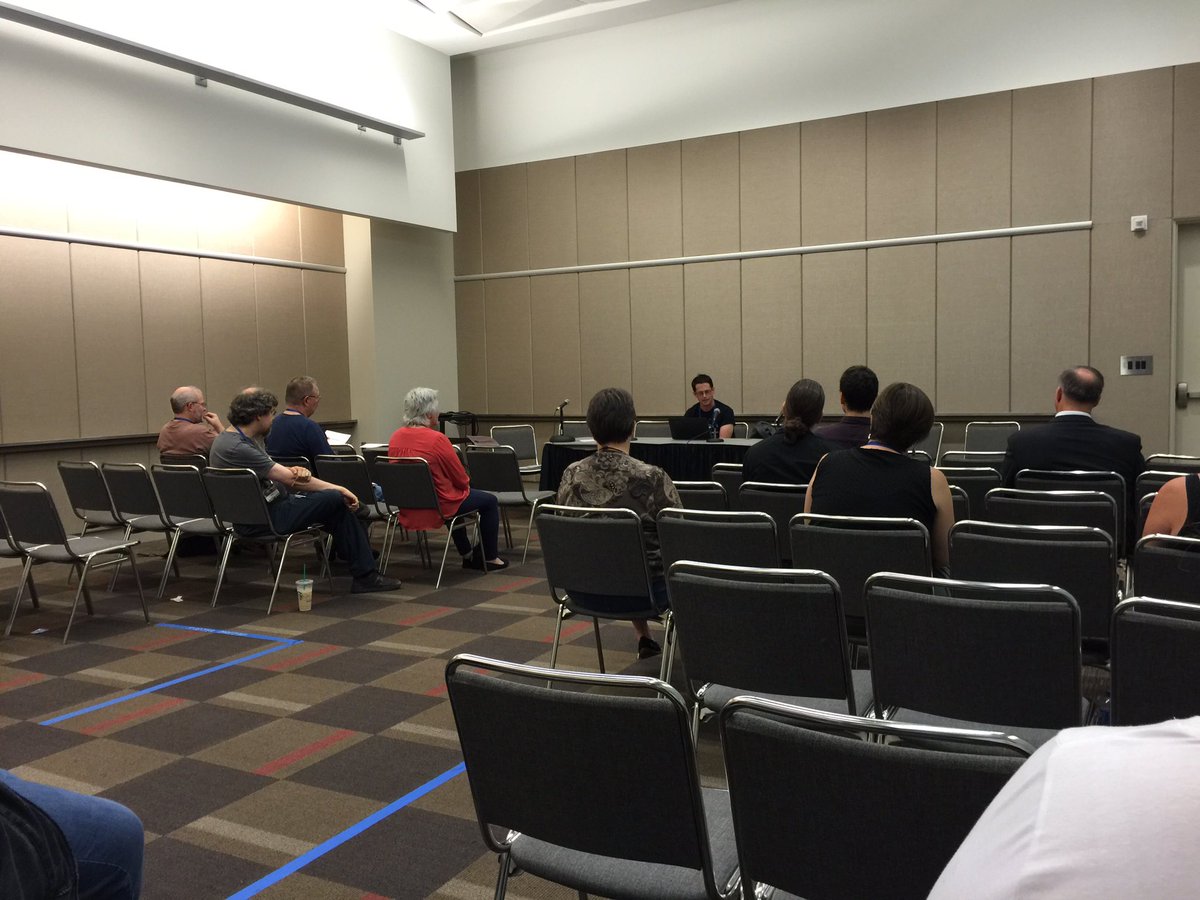 I was very excited to find out not too long before the convention that I had been assigned a 30-minute fiction reading (Well, 25 minutes, to allow some time to let the next author get prepared). It… wasn’t what you would call an ideal timeslot, being from 7-7:30 on the night that the Hugo Awards start at 8–so at that time most people who were at all interested in watching would be finding seats in either the auditorium or in some other group viewing area where they were streaming.
I was very excited to find out not too long before the convention that I had been assigned a 30-minute fiction reading (Well, 25 minutes, to allow some time to let the next author get prepared). It… wasn’t what you would call an ideal timeslot, being from 7-7:30 on the night that the Hugo Awards start at 8–so at that time most people who were at all interested in watching would be finding seats in either the auditorium or in some other group viewing area where they were streaming.
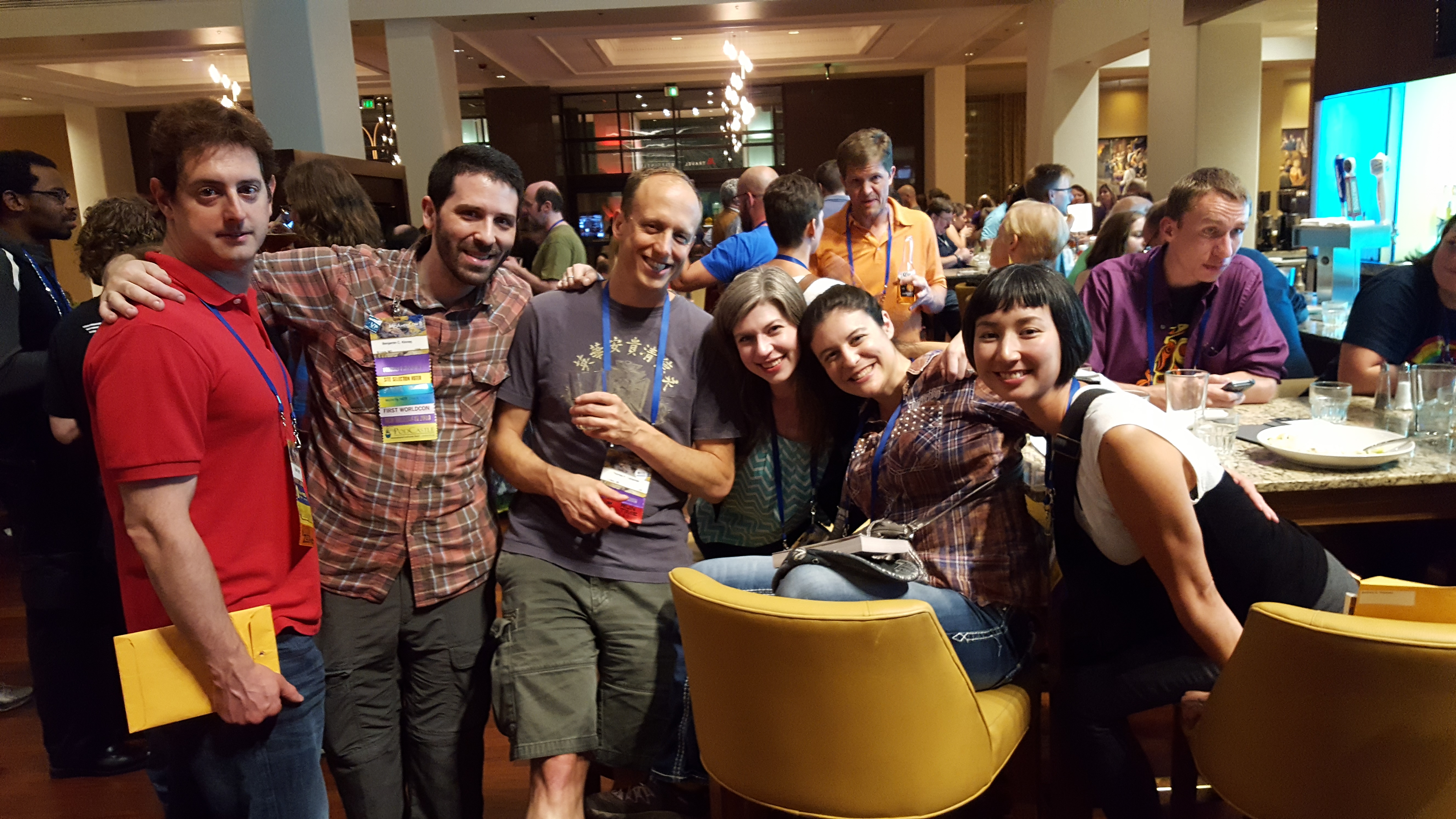
But to my surprise, approximately 13 people were there just to hear me recite things I made up! This is a quite large turnout for someone like me who is not well-known for their writing.
Of all the readings by other people that I attended, most people read either one work that fit very closely into the time allotted, or maybe two things, or an excerpt from a longer work. I flipped through upcoming stories and though I would’ve loved to read part of my upcoming story that will be in IGMS, it is a bit of a sprawling story so that it would be hard to find a representative sample. And, well, in my opinion my best writing is very short, punchy stories of 500-1000 words. So, I decided to buck the trend and I ended up reading 5 stories in my allotted time.
I read “My Wife is a Bear in the Morning”, written as an complaint letter to an apartment manager by a man whose wife is literally a bear in the morning (you can hear it in audio at Podcastle).
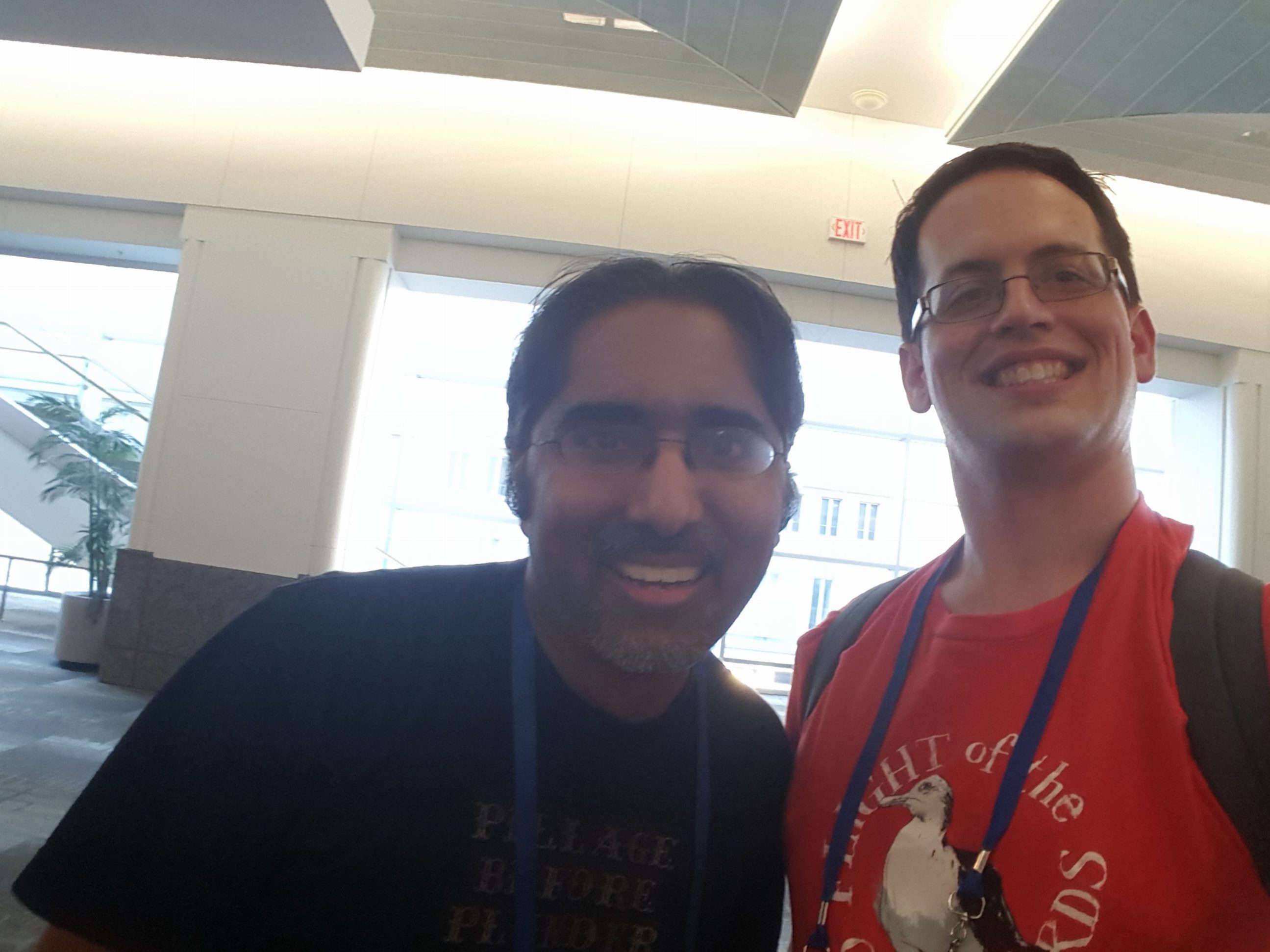
I read “So You’ve Decided to Adopt a Zeptonian Baby!”, written as a brochure to help those who’ve decided to adopt those invincible alien babies that keep falling from the sky in meteor showers. (you can hear it in audio at Podcastle)
I read “This Is Your Problem, Right Here”, which is a story about a woman who has recently purchased a water park and finds that the plumbing doesn’t work properly when she opens in the spring, and it starts as a plumber tells her that this is because all of her trolls have died (the existence of trolls are not common knowledge in this world). That was originally published in Daily Science Fiction, you can also hear it at Cast of Wonders.
And I read two others that are as-yet unpublished, so I won’t discuss their details here.
The reading seemed to go over well. I got some compliments, and people said they liked the quick changeups of stories, especially at the end of a long day when everyone was getting tired.
Books
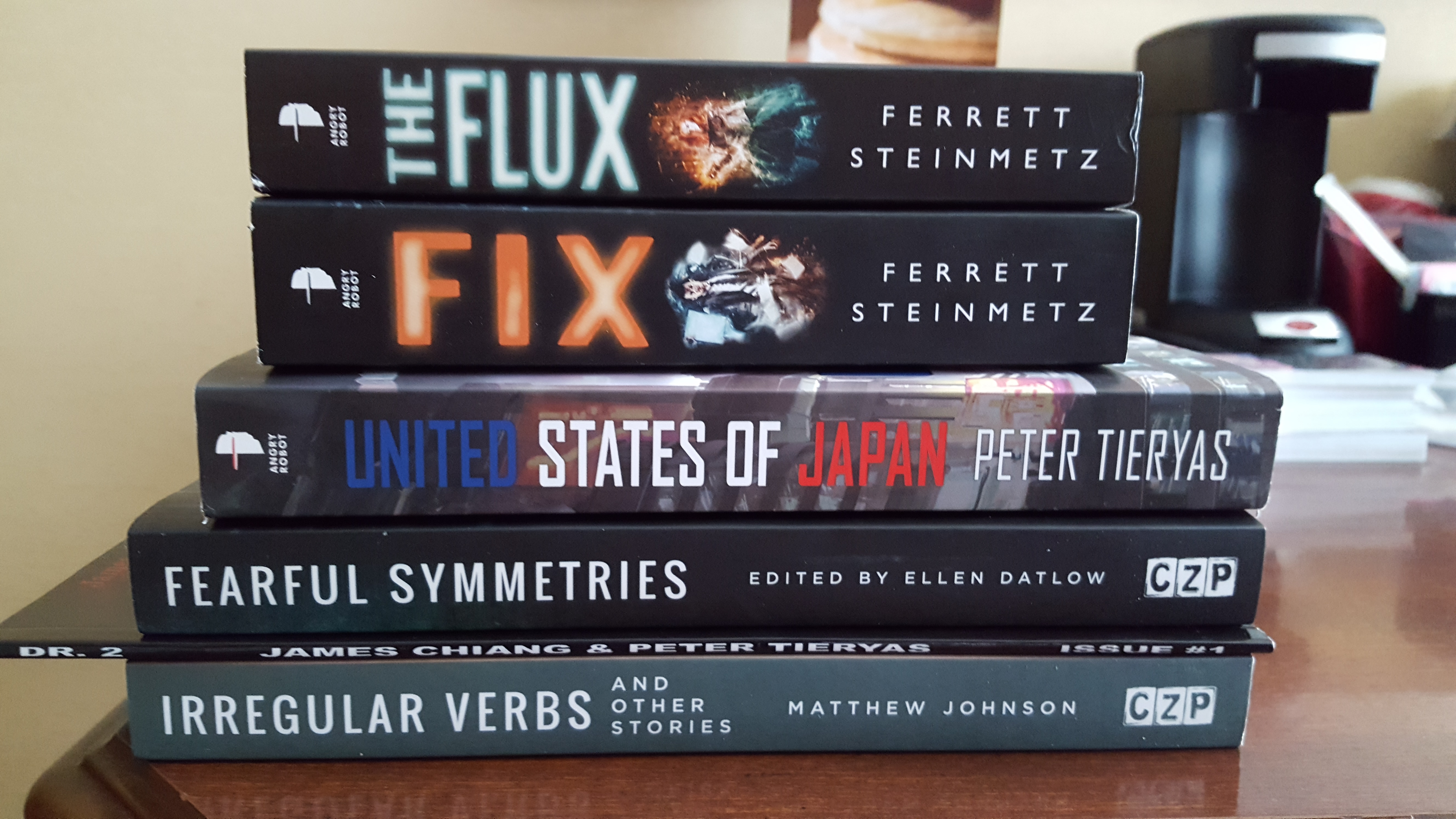 The one book that I knew ahead of time that I was going to buy was The Flux by Ferrett Steinmetz. I already own the book. I already love the book. But I only had it in ebook, and I love these books so much I felt like I should have a signed paper copy. And, since Ferrett was onsite, it seemed best to go ahead and buy it so that I could get him to sign.
The one book that I knew ahead of time that I was going to buy was The Flux by Ferrett Steinmetz. I already own the book. I already love the book. But I only had it in ebook, and I love these books so much I felt like I should have a signed paper copy. And, since Ferrett was onsite, it seemed best to go ahead and buy it so that I could get him to sign.
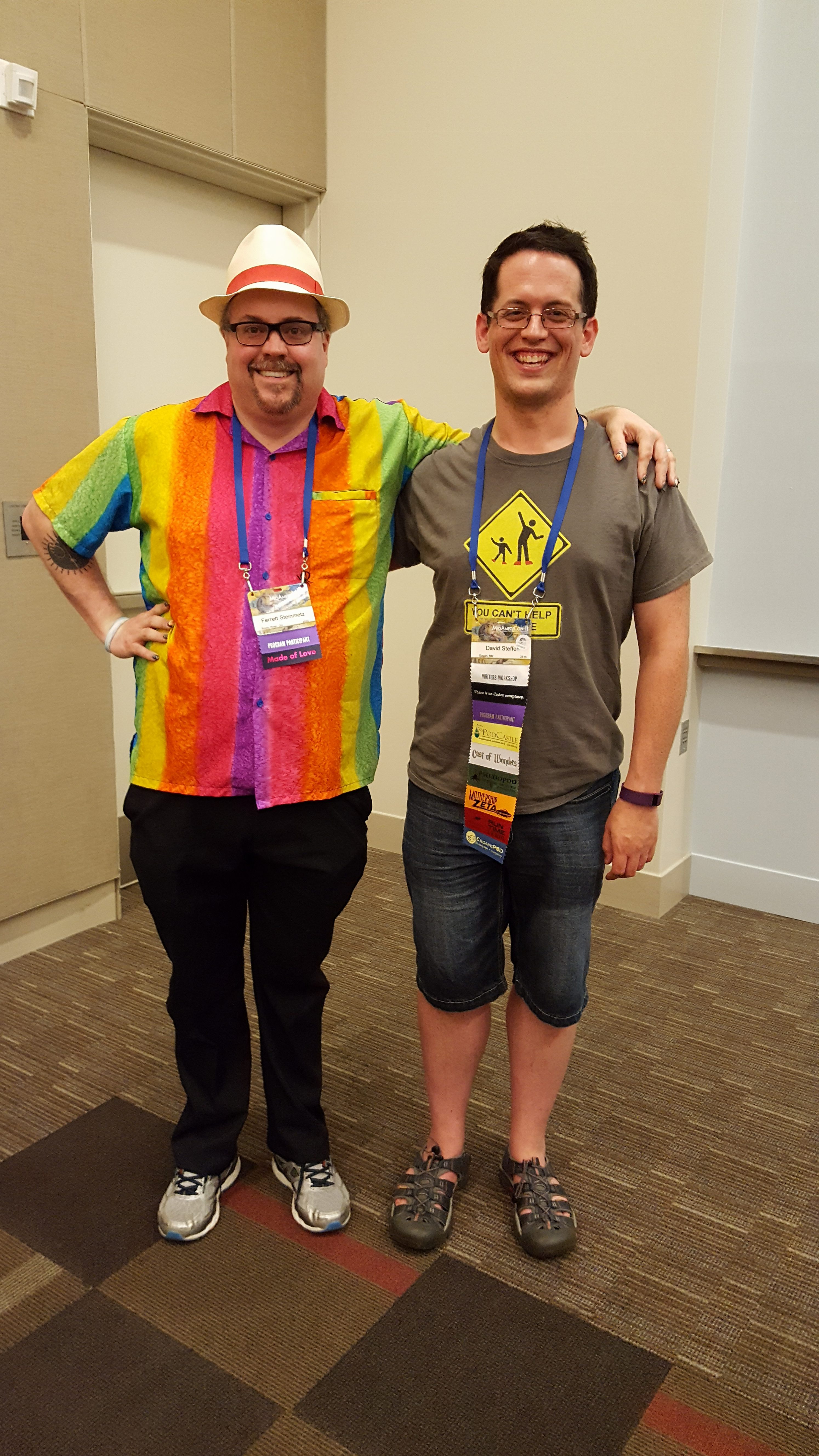
I knew that Ferrett’s next book, the third in his ‘Mancy series, was coming out soon, but that the release date was not for a little while yet. But Angry Robot Books had the book on sale at their vendor booth! So, obviously that came home with me too. And I am SO EXCITED to read it.
So I showed up at the Angry Robot booth to buy The Flux, and knew I had to buy Fix, a very nice man (whose name I didn’t immediately recognize and so didn’t pay all that much attention to) behind the counter told me that I could get a discount if I bought one of the larger form-factor books. Not really intending to buy a lot of books (because I have such a stack at home, I am a slow reader) I saw that United States of Japan by Peter Tieryas was on display, and I had heard someone talking about how good that was earlier, so that was the first one I picked up. The guy behind the counter started telling me about it and I tried my best to unrudely say “yeah yeah let me just read the back cover descriptio myselfn” (I hope I didn’t across as rude! I like taking verbal recommendations from fans of a book but at pretty much any kind of store I would rather just look at stuff without staff discussing everything I look at–it makes me very nervous if I feel like the staff are hovering and I will be much more inclined to scurry away than to buy). It did indeed sound really interesting, a story where Japan won World War II and ended up in control of the United States. I glanced at some of the other books, flipped a few over to read the back, but decided that United States of Japan caught my eye much more solidly than the others. So I decided to buy United States of Japan. The guy behind the counter rang me up and then offered to sign my book… at which point I of course realized that I was talking to Peter Tieryas, the author of the book I’d just bought, so I laughed at the fact that I had not noticed the matching book cover and name badge and took him up on his offer. (This concludes my telling of “The Time That I Wouldn’t Let Peter Tieryas Finish Pitching His Book To Me But Then I Bought His Book From Him Anyway Without Realizing He Was the Author of Said Book: A Tale of David Steffen’s Inattention to Detail”)
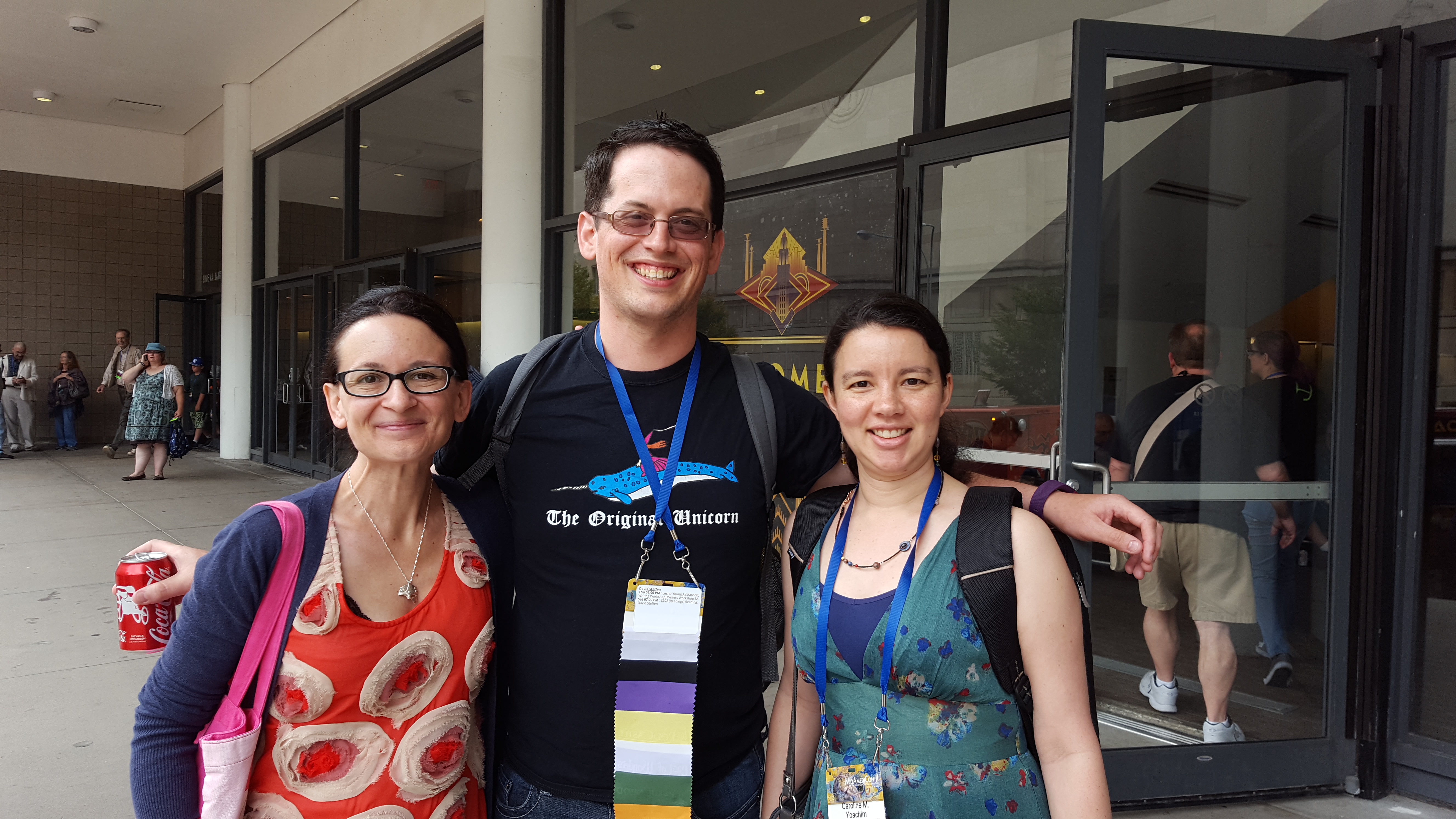
Caroline M. Yoachim and Tina Connolly both had book releases from Fairwood Press at WorldCon. Caroline’s book is a short story collection titled Seven Wonders of a Once and Future World. Caroline is an incredible short story writer, and consistently hits out of the park for me, so I am buying the ebook for this one. Tina‘s short story book is a short story collection titled On the Eyeball Floor. Tina (along with Caroline) is another writer who, when I hear they have something new out, I don’t ask for a pitch I just say “shut up and take my money”. So, I’m buying that ebook too. It was quite fun to watch these two launch together–they made it a friendly competition where they made a wager on it and the Fairwood Press vendor table had a running tally sheet of sales. They ended up tying at the end, which is hilarious and perfect.
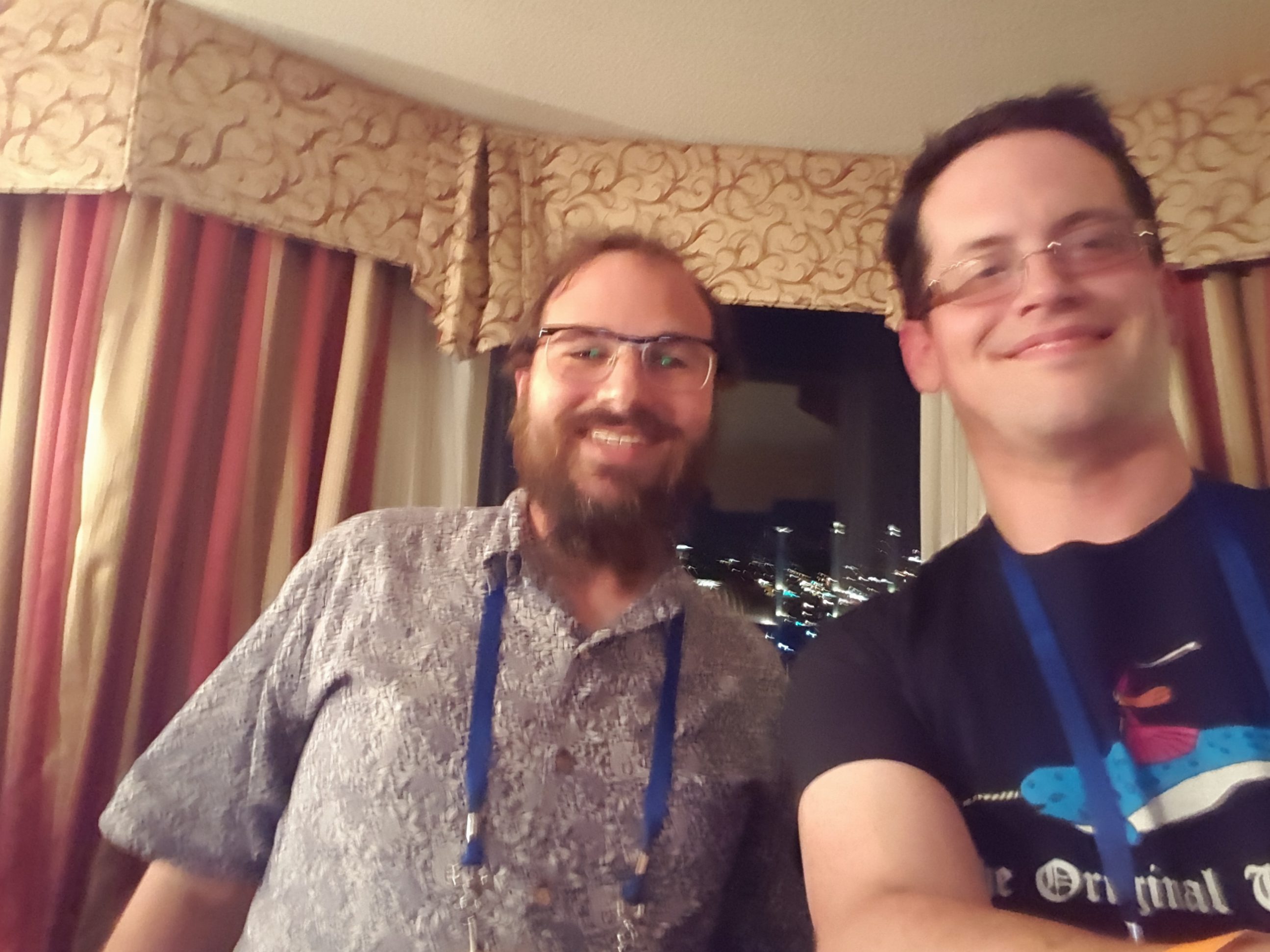
I stopped by the freebie table once, at a time when it was a twenty minute wait to get to the table. After that wait I felt like I had to grab the maximum of three books even though I don’t really need more books. I saw a stack of Briarpatch by Tim Pratt and grabbed a copy even though I already own and love the book, so that I could give a copy of it away to the next person I talk books with. I also picked up a copy of Fearful Symmetries, edited by Ellen Datlow, and a short story collection by Matthew Johnson titled Irregular Verbs and Other Stories.
I also had a few extra copies of the Long List Anthology left over from last year’s Kickstarter and I decided that there was no better way to use them than to bring them to WorldCon and give them out to people when I chat with them. I saved one to give away at my fiction reading and gave three out when it felt appropriate, so that was fun!
Programming
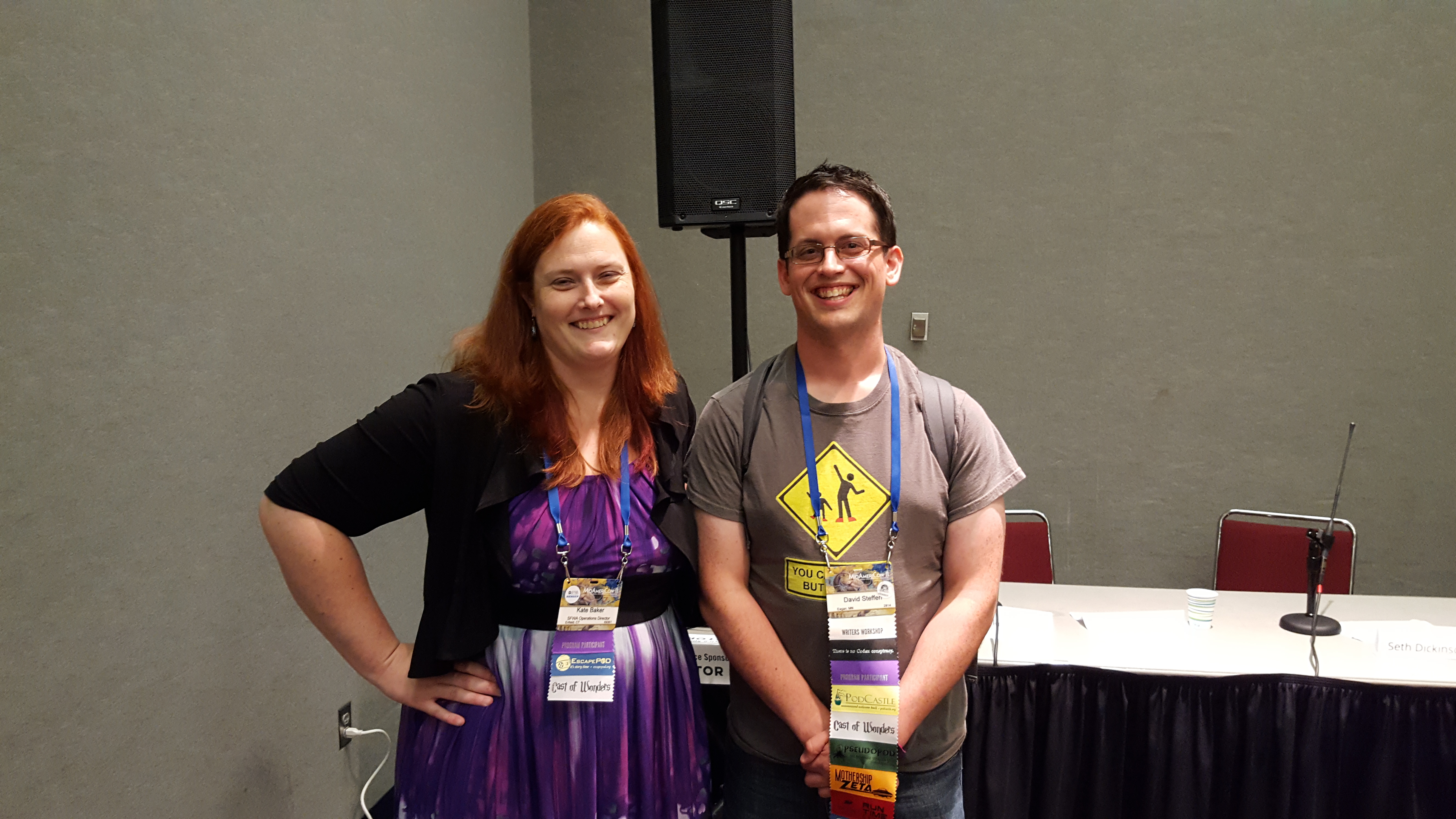
I did not attend many panels this time around. I attended a very select few that were on very specific topics that were very near and dear to my heart or to specifically try to meet some of the panelists that were on my mental list of people that I wanted to meet.
Other than that, I tended to favor readings of authors: I went to readings by Caroline M. Yoachim, Terra LeMay, William Ledbetter, Loren Rhoads, Stefan Rudnicki, Kate Baker. And readings of magazines: Escape Artists, Flash Fiction Online, Asimov’s.
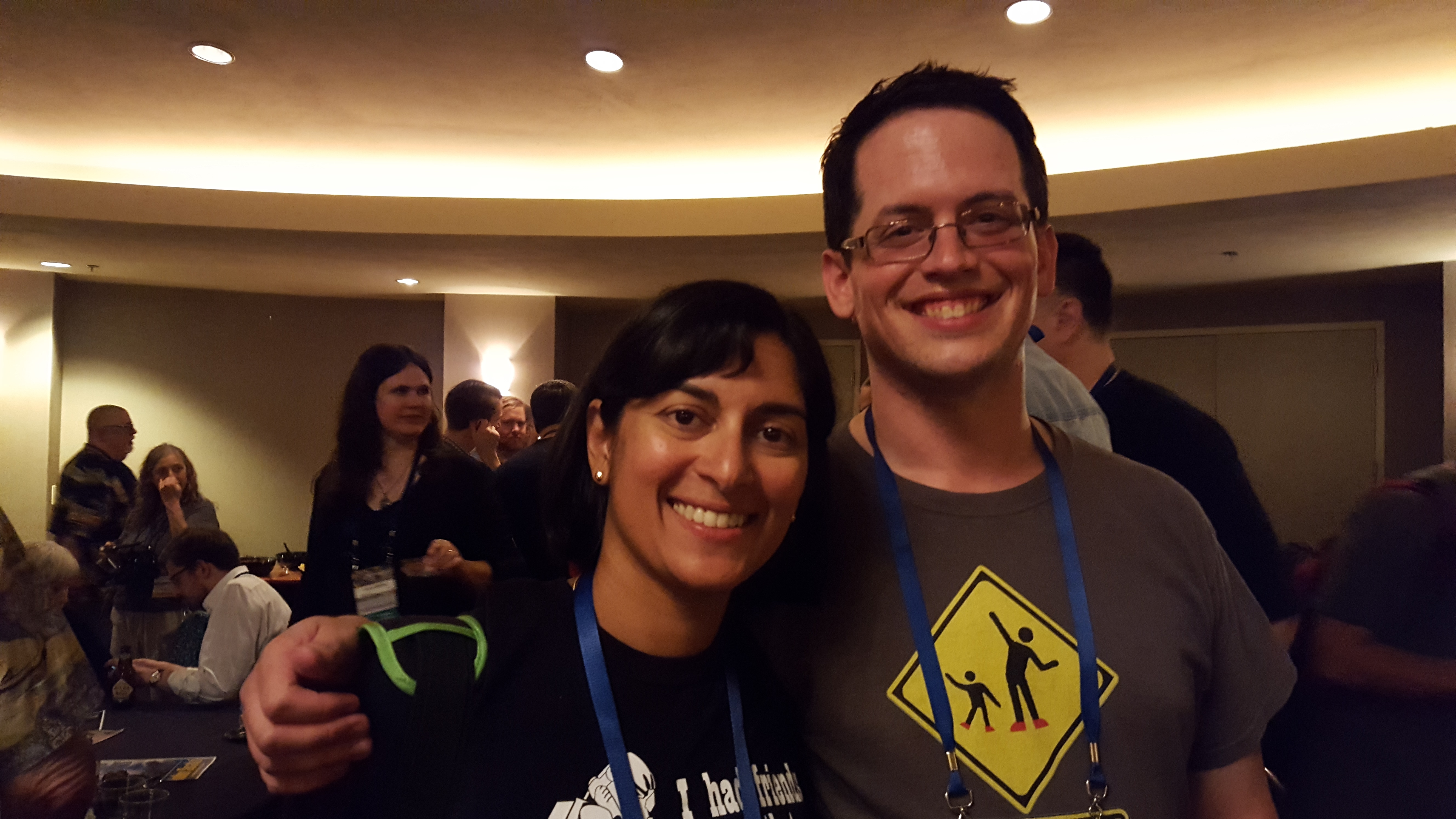
I loved all the readings, but the highlight was the Flash Fiction Online reading, particularly “I am Graalnak of the Vroon Empire, Destroyer of Galaxies, Supreme Overlord of the Planet Earth. Ask Me Anything.” by Laura Pearlman, which was read by a full cast of readers, including Sunil Patel as Graalnak himself, and was a riot to listen to.
As well as kaffeeklatches, which are really just organized hangouts with people of interest–you signup in time to claim one of 9 slots and then you spend 50 minutes hanging out with that person. I did kaffeeklatches with Kate Baker, Ken Liu, and S.B. Divya.
The People
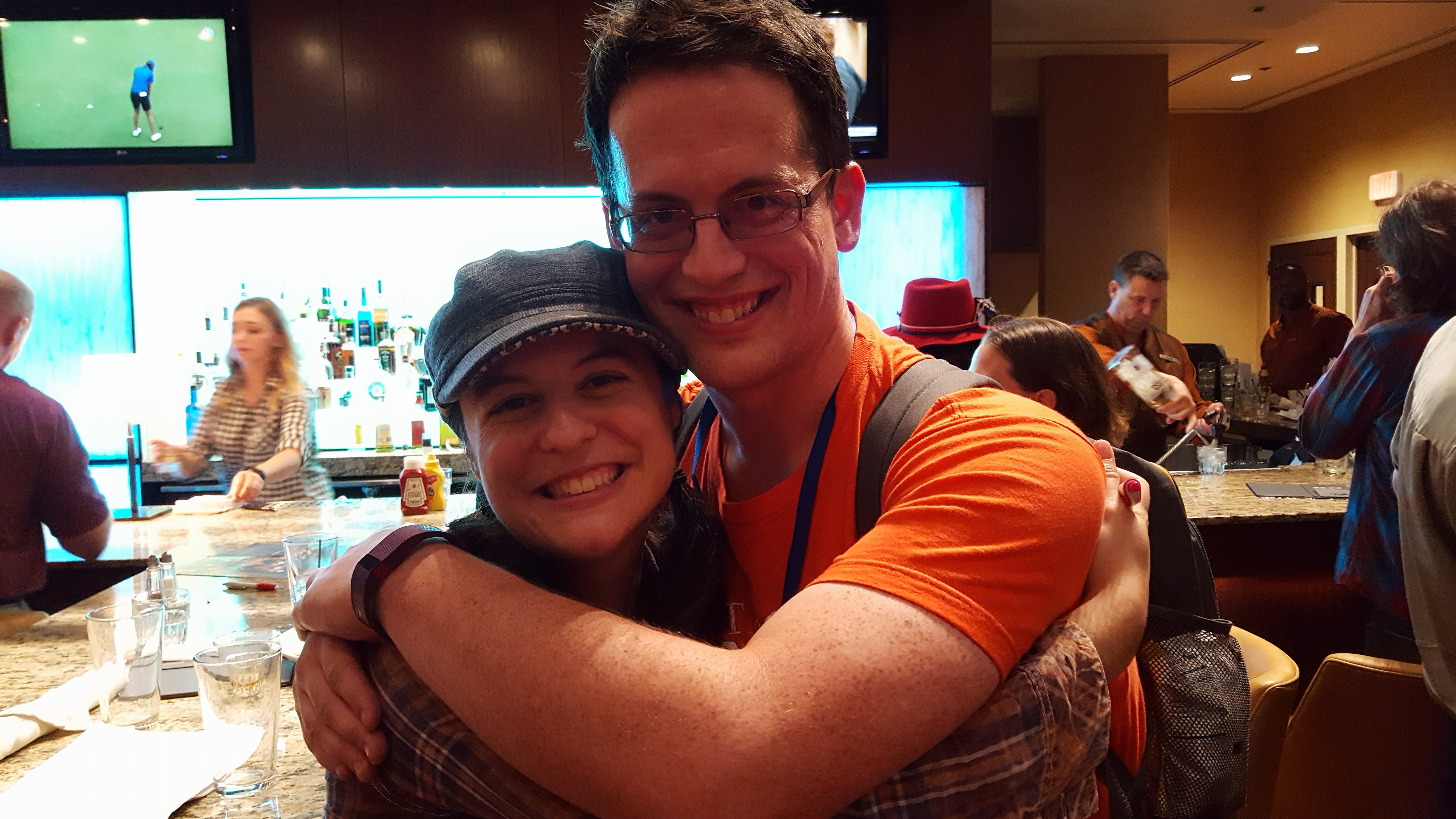
So. Many. People. So wonderful to put faces to names for people that I have known online for years.
I am not even going to try to make a comprehensive list, because there is no way that I will remember everyone and I don’t want those that I do forget to feel left out. But I will list out a few.
Shortly after rushing to the critique session that I was almost late for, I met up with my writing group friend Doug Engstrom–we’ve swapped critiques and discussion for years, so it was great to meet him in person and to interact with him off and on throughout the weekend.
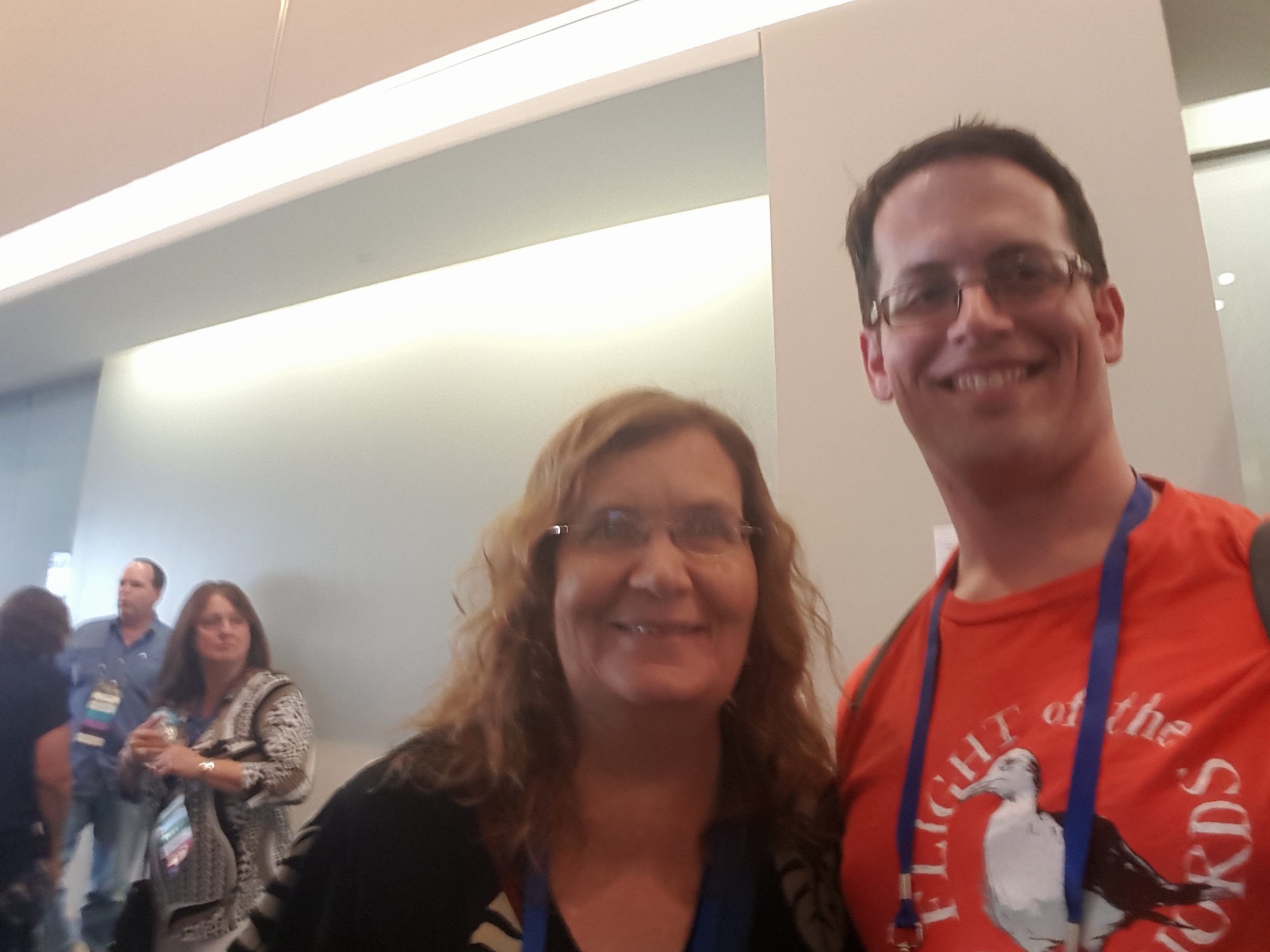
I got to meet Stefan Rudnicki and Gabrielle de Cuir, the masterminds (and mastervoices) behind Skyboat Media. They are most well known for producing the Lightspeed Magazine and Nightmare Magazine podcasts, and for performing much of the voice-acting for those productions. I have a direct professional connection with them in that they produced the audiobook version of the Long List Anthology last year–of which they sold out at their booth during WorldCon. They both have voices that I have heard for so long in story narrations that it was both wonderful and very weird to meet them in person–I associate their voices so strongly with storytelling that my brain sinks into story listening mode and I kind of had to yank it out of that mode because, hey brain I’m trying to talk to people here! It was great to meet them and talk business and chat.
Speaking of meeting people whose voices are incredibly familiar to me: I met Alasdair Stuart and Marguerite Kenner. They are the owners of Escape Artists, which is the parent company of most of my favorite podcasts: Escape Pod, Pseudopod, Podcastle, and Cast of Wonders, as well as the quarterly ebook zine Mothership Zeta. Alasdair has been on the staff of Escape Artists for more than ten years, and he was the host of Pseudopod at the time that I made my very first fiction sale of all time to Pseudopod and decided that maybe I ought to try listening to the show (which has resulted in an 8 year listening binge of all the podcast fiction I could find that still continues today). Marguerite is the editor and host of Cast of Wonders. They are incredible, smart, nice, welcoming, helpful people, and I want to hang out with them forever.
Kate Baker, is another one of those familiar-voiced people and I was happy to get a chance to hang out with her at kaffeeklatch and elsewhere. (And again with the barely being able to talk because I am so familiar with her voice from podcasts!)
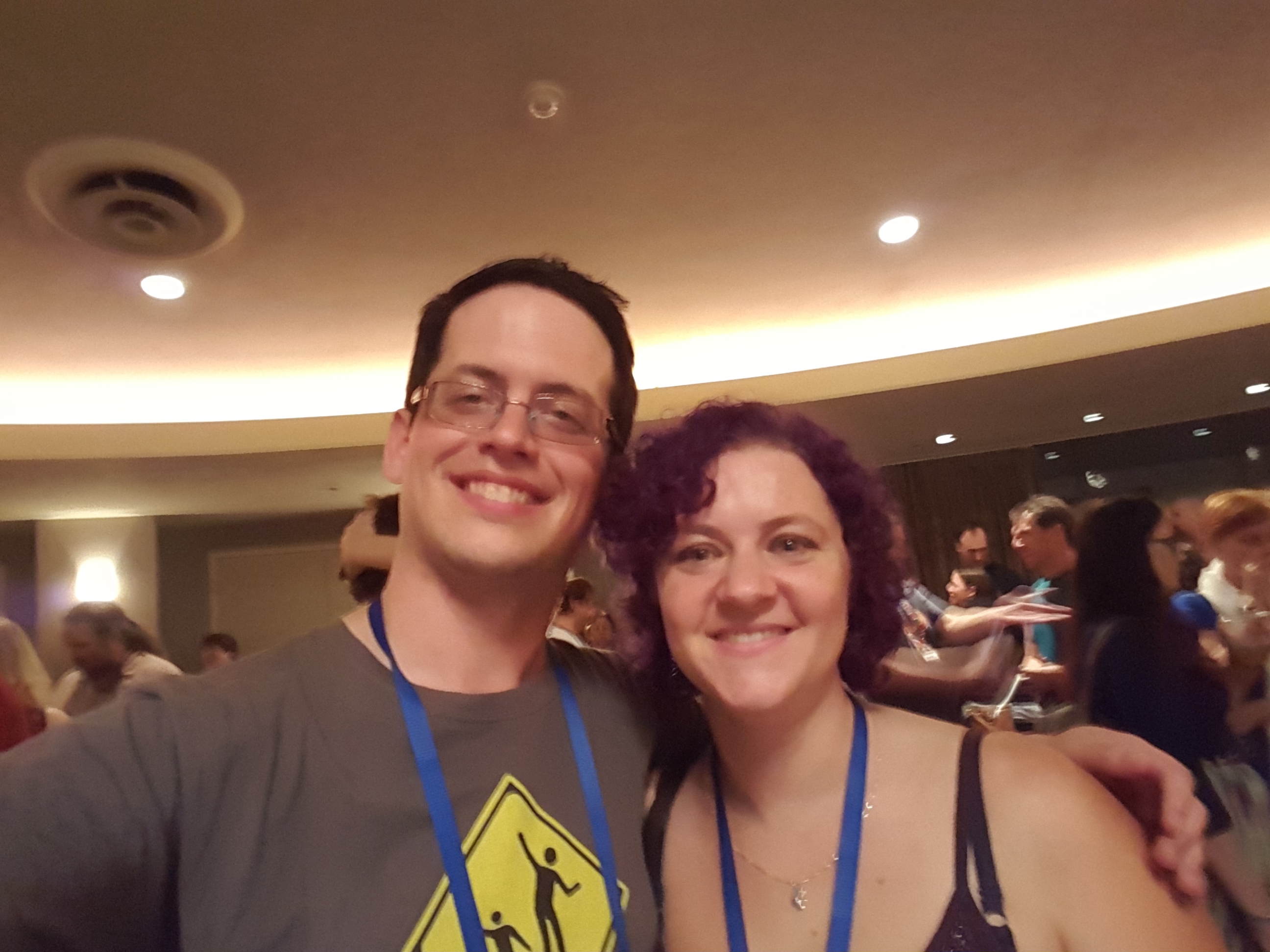
It was wonderful to meet Sheila Williams, Neil Clarke, C.C. Finlay, Caroline M. Yoachim, Tina Connolly, Martin L. Shoemaker, Marina J. Lostetter, S.B. Divya, Ken Liu, Alyssa Wong, so so many others.
I got to meet a few writers whose short stories I have purchased: Andy Dudak, Tina Gower, Sunil Patel, Jon Lasser, Andrea G. Stewart. (it makes a handy icebreaker to say “Hi! I bought your story!” 🙂 )
Meeting people was easily the highlight of my convention experience.
The Hugo Awards
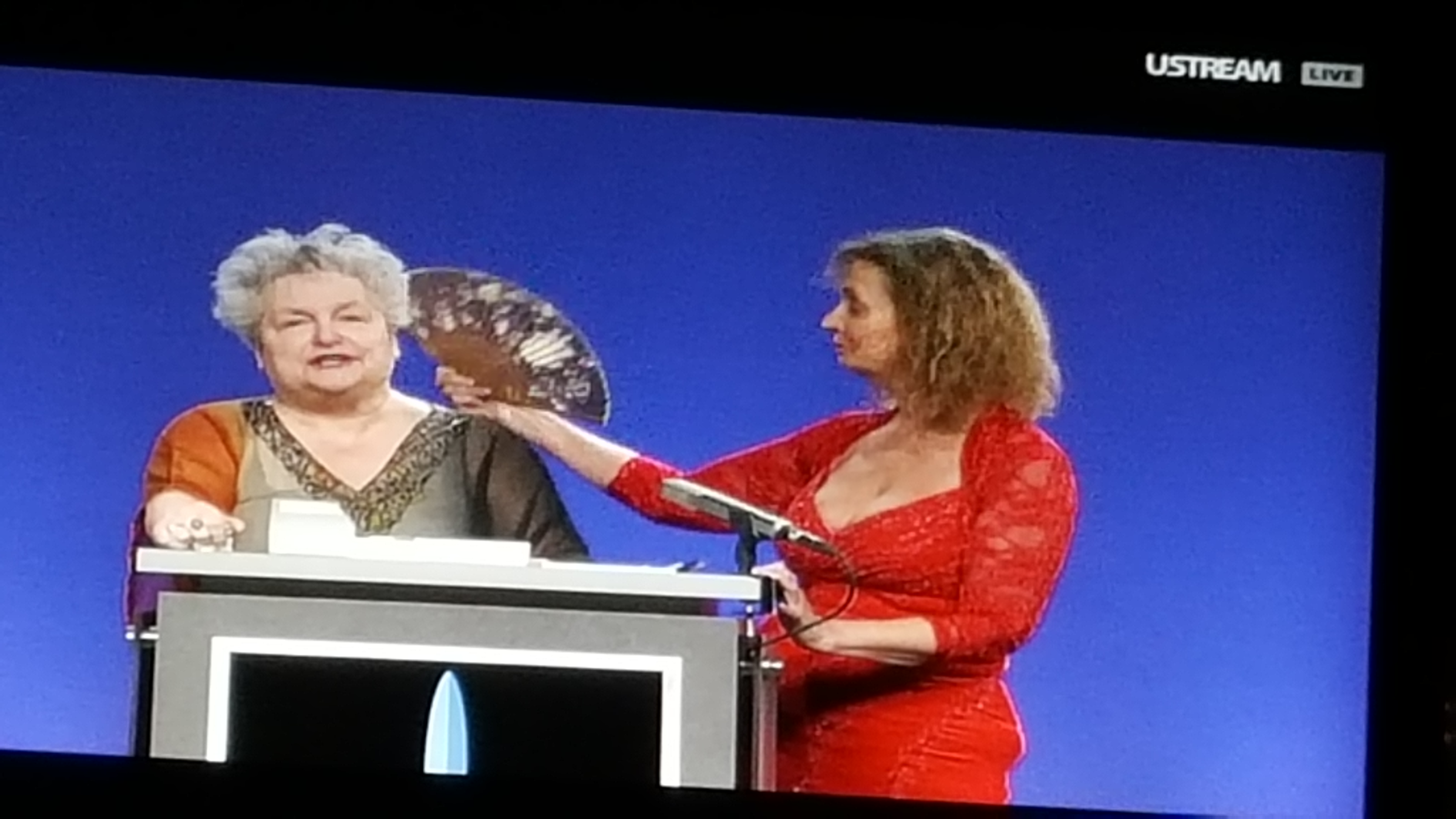
The Hugo Award ceremony was held Saturday evening and was hosted by Pat Cadigan. Cadigan was a wonderful and hilarious host, and really overall the awards went as well as I could have hoped given the ballot they started with. Lots of awesome things won. A couple categories got No Awarded (Related Work and Fancast I believe?) but none of the fiction categories which are my main interest in the awards.
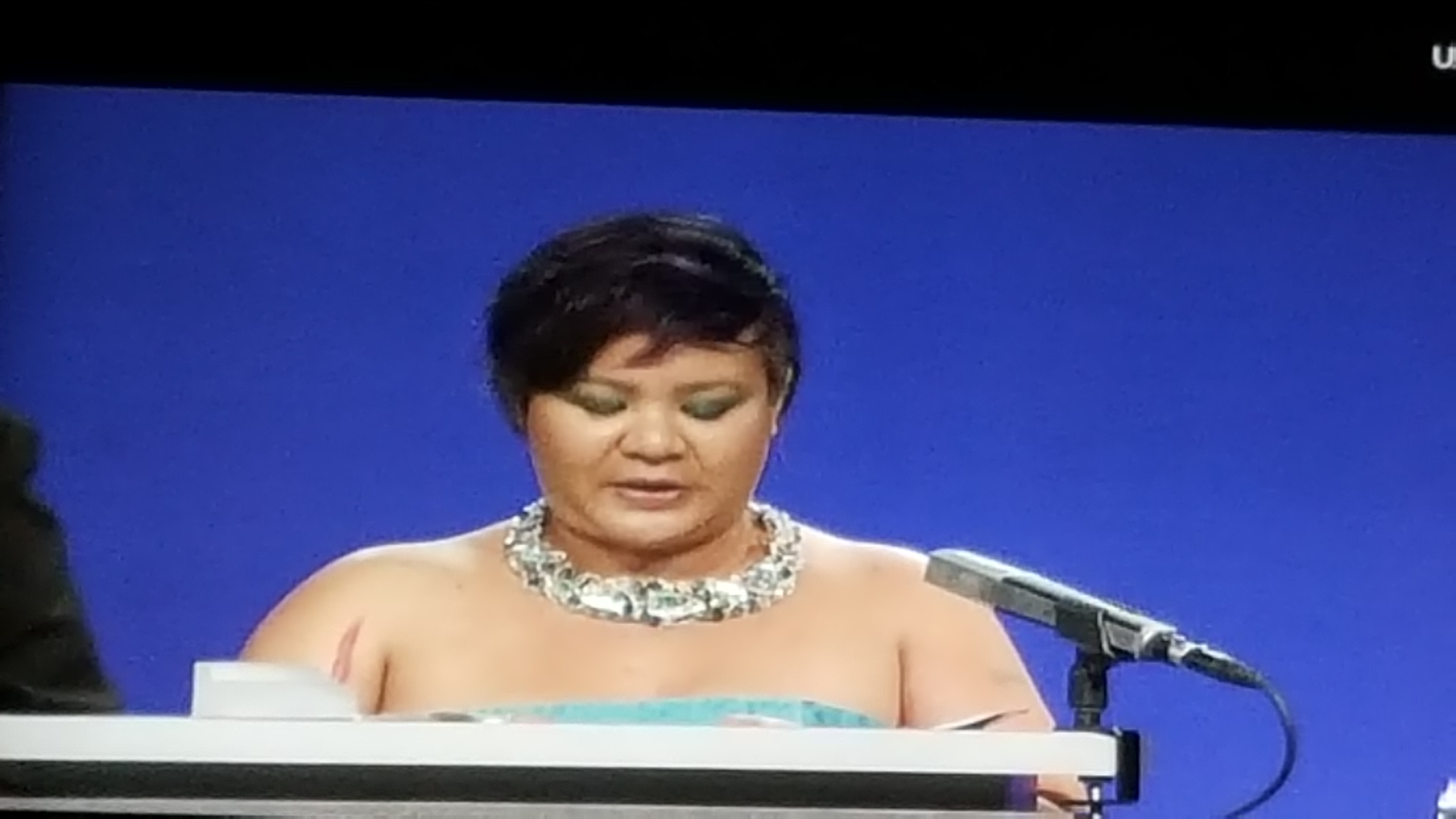
Uncanny won Best Semiprozine in its first year of eligibility! Naomi Kritzer won for Best Short Story for “Cat Pictures Please”! Hao Jingfang and Ken Liu (who was the translator in this case) won for Best Novelette for “Folding Beijing”! Nnedi Okorafor won for Best Novella for “Binti”! N.K. Jemisin won for Best Novel for The Fifth Season! Neil Gaiman won for Best Graphic Story for Sandman!
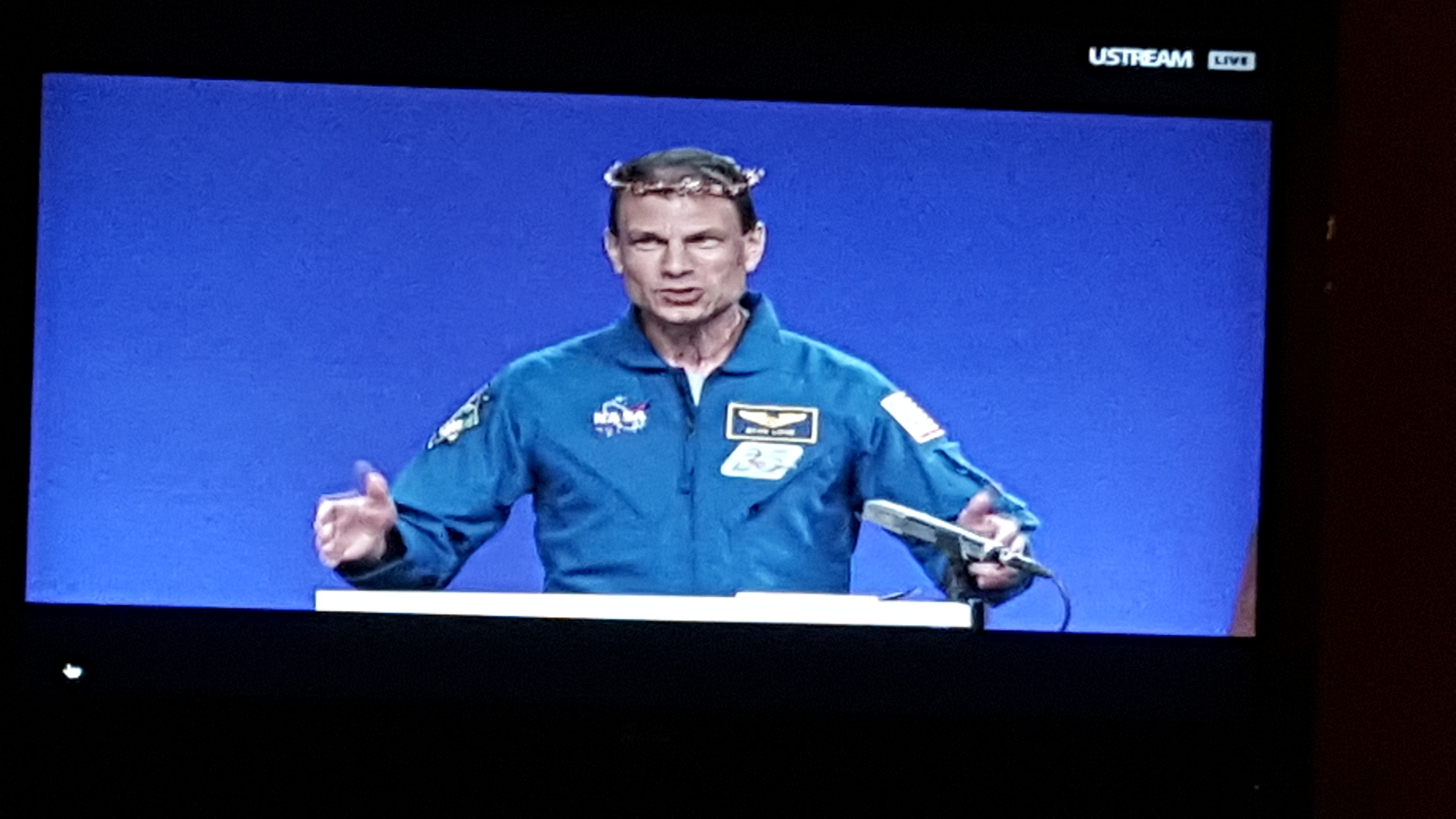
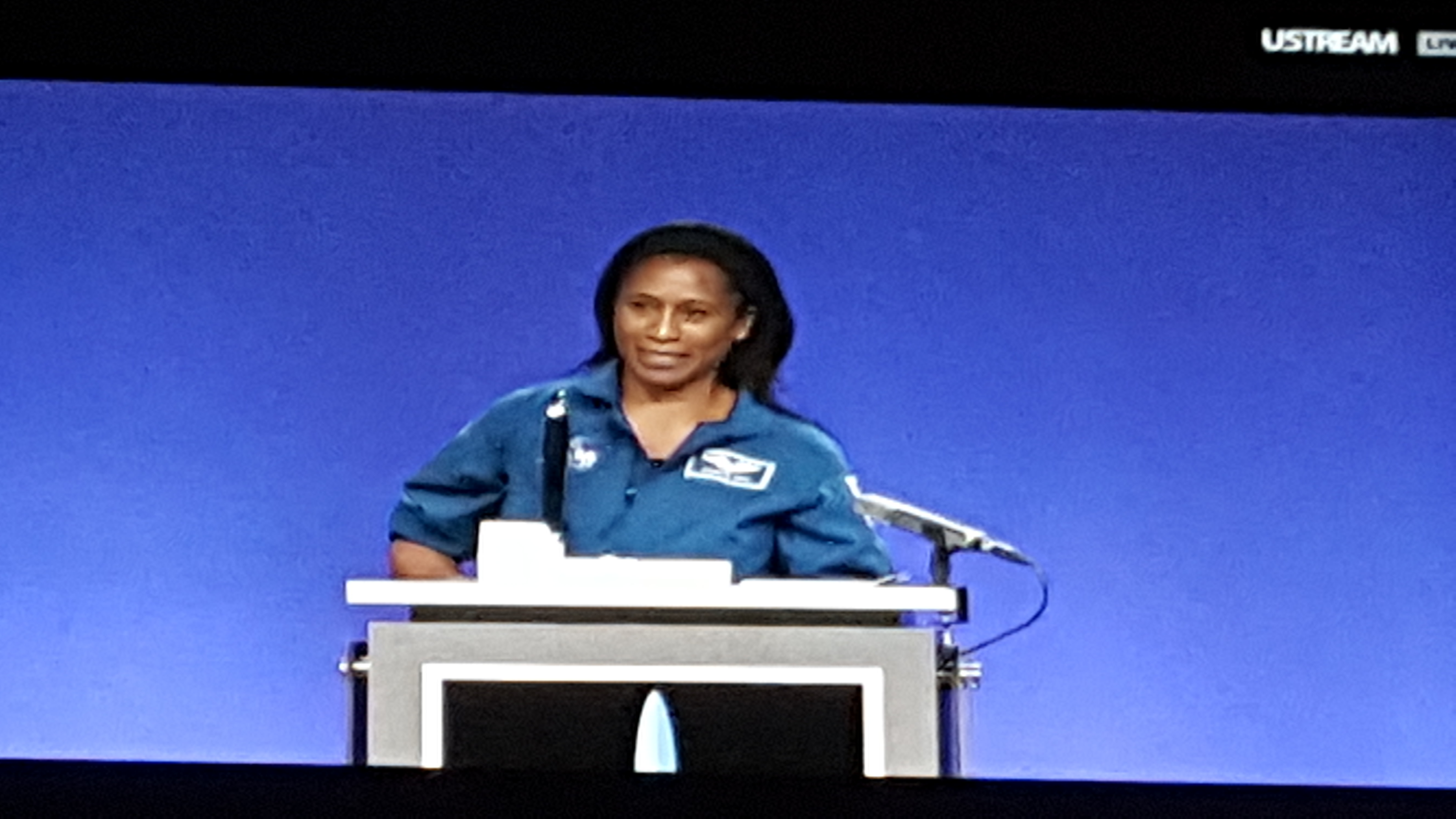
The Martian won Best Dramatic Presentation, Long Form, and its author Andy Weir won the Campbell Award! For each of them an astronaut accepted his award for him and talked about how much The Martian meant to them, that it got the science and the feel of the interpersonal relationships of the astronauts right!
Yes, there are a lot of explanation points in this section, but they are all deserved. Especially after last year with the fiction categories getting so many No Awards, it was a major relief that all the fiction categories were awarded, and to such incredible people and recipients.
I watched from the very crowded SFWA suite this year, in part because my reading was too close to the ceremony to have much chance of finding a seat. It… was more than a little cramped, but it worked out pretty well.
The Long List
Most of you who follow me at all already know about the Long List Anthology, but I’ll give a quick rundown for anyone who might not have heard about the project. Every year, after the Hugo Award ceremony, the Hugo administrators publish the longer list of works that were nominated in each category–approximately 15 including the 5ish that are on the final ballot. In most years, these works don’t receive a great deal of extra attention even though that longer list makes an excellent recommended reading list.
Last year I launched the Long List Anthology, which published stories pulled from that longer nomination list. It totalled 180,000 words, about 500 pages in print, and featured some of the most popular contemporary short story authors like Sam J. Miller, Amal El-Mohtar, Elizabeth Bear, Ken Liu, Kai Ashante Wilson, Alaya Dawn Johnson, and others. The book continues to sell steadily even now, and has sold more than 9000 copies (which is more than the Hugo voting population has been in any year).
The project was so successful last year, that I have decided to repeat the project this year–the list is here. I am in the process of reading stories in the different categories and sending queries to the authors. Last year the cover art was reprinted art from Galen Dara. This year I’m taking that to the next level and commissioning original artwork from Galen Dara. And I’ve got a few surprise ideas to try out for stretch goals, too.
There will be a Kickstarter to fund the anthology–I look forward to sharing links and the good news with you all–I am aiming for mid-September.
WSFS Meetings
You may not know what WSFS Meetings are, but you’re probably familiar with the Hugo Awards, awards that are nominated and voted on by supporting members of WorldCon. WSFS meetings are held every year at WorldCon, and they define rule changes to the Hugo Awards. Anyone who has an Attending WorldCon membership can show up and debate, vote, help decide new categories or nomination rule changes and so on. I fully intended to go to at least one meeting while I was at WorldCon, because I do value the Hugo Awards and this once-a-year batch of business meetings defines everything. But… I was a horrible person and didn’t attend any of them. Nonetheless, some important rule changes went through this year, which I have been reading about after the fact, so I shall list out some of the more interesting ones (of the ones I understand) and give my reaction. My primary source for the WSFS Meetings that last couple years has been Rachael Acks’s blog. Rachael is a writer and editor, and is also involved in WSFS, both liveblogging updates as the meetings happen, and giving summaries and reactions afterward–which gives a very nice place to catch up on what you missed if you can’t or don’t go to the meetings.
Here is a list of the business agenda they started the weekend with, with a daily meeting scheduled from 10am to 1am. Or for a more informal version with Rachael’s reactions to items, you can check out this page.
I am honestly just catching up on these things now, so it’s entirely possible I got something wrong typing all this up.
Best Fancast category is now a permanent category
The Best Fancast category was defined a few years ago, and has been a trial category that would have expired after this year if it hadn’t been ratified again. I have mixed but mostly negative feelings about its permanent addition. I do feel that the Hugo Awards have been slow to consider publications in new media–it took quite awhile for online magazines to be considered seriously and audio-only publications have been slow to start to get some recognition, even when they are publishing original fiction of excellent quality. When the Fancast category had first come out I was excited that maybe this little niche would encourage more serious recognition.
Part of my disappointment has been that every nominee, except for StarShipSofa, has been nonfiction. That’s… fine, I guess. People like nonfiction podcasts, apparently. But I really want to see fiction podcasts recognized, especially fiction podcasts that pay their contributors and which publish original fiction and don’t need to beg their listeners for votes in every episode.
The rest of my disappointment is that, for my favorite podcasts, it is quite unclear what category they actually qualify for. They could be a Semiprozine or they could be a Fancast. The differentiation between the two is not well-defined in the current rules. If Fancast is supposed to actually be nonfiction, as voters have been treating it, then I would prefer that it would just be defined as such, so that this differentiation was at least clear. And a common point of confusion is that people assume Fancast is the A/V equivalent to Fanzine, meaning that it’s defining trait is not paying its contributors. (I have had discussions with people who advocate for the Fanzine category and they insist that this is NOT the defining feature, but according to the rules that are actually used to administer the award that is the main difference). But the rules seem to imply that Fanzine is also the A/V equivalent to Semiprozine. And what happens if a publication published in both audio and text? There is some precedent in Beneath Ceaseless Skies and Clarkesworld and Lightspeed and others who both publish in both and who have gotten Semiprozine nominations, but other publications that also get both like Escape Pod came at it from the other direction and I think most voters think of them differently as a result.
I liked the Escape Artists editorial strategy last year, suggesting that if anyone wanted to vote for them, that EA would prefer they do it in the Semiprozine rather than the Fancast category. I thought this was a good idea, to encourage the fans to pick one specific side of the equation because one issue with having an ambiguous category is that maybe you have enough fans who want to vote for you to get you on the ballot, but if they’re splitting their nominations across two categories that kind of ruins that chance. Also, I don’t believe it’s possible to absolutely determine whether something is eligible for one category or the other unless it actually reaches the ballot level–at which point it will either be invited to be on the ballot, or it will be removed as being ineligible. Either case you’ve learned something which can help future voting, and it may even help push through some changes that better define the rules in the future.
The Five Percent Solution
Prior to this year there has been a requirement that all but the top 3 entries in a category must have at least 5% of the overall vote, or they are simply not on the ballot. This rule was a bit silly because it caused a reaction to larger pools of award-worthy worker and larger nominating group by REDUCING the category. This didn’t start hitting the ballots until a few years ago–that’s why you sometimes saw the Short Story category with only three items on it instead of five.
Very glad to see this bit removed from the constitution, so now you’ll see five items no matter what.
Electronic Signatures for Site Bids
Historically WorldCon has kindof been more USA-con. A lot of people have been trying to put the World in WorldCon and encourage it to be more internationally located. I’m a proponent of having it be more international (even though I will probably not be able to afford to go to most non-USA located years), and this helps more people vote for it without having to be physically present, so I think this is a positive change toward that goal.
Best Series Category
The idea behind this one is that some people felt that series of books that were remarkable and awesome series may not be likely to be nominated for Best Novel for their individual books. This category would be for those kinds of books–a series would be eligible after so many words have been published in the series, and would be eligible again after so many words have been published again after the first nomination.
I… don’t really see the point in this category. Individual books are already eligible, and if those individual books aren’t winning awards… it doesn’t seem like we really need to define new categories to handle that because maybe just some things are less likely to win, but we don’t need to make new categories for every little thing.
Not only that, but the eligibility would be harder to determine than any other category, since it would depend on when the last nomination for a series was, and how many words were in each book (which isn’t generally immediately obvious).
Nominee Diversity
The idea behind this change is to prohibit the same entity from being nominated more than one time in a category (in which case I think the highest ranking item for that entity would be on the ballot). This was probably proposed in part based on John C. Wright’s shenanigans-related 5 nominations of a couple years ago. But more importantly, to me, this should make the Dramatic Presentation Short Form category much much more interesting, because there are many years where that is effectively the Best Doctor Who Episode category.
I am glad to see this go into the constitution, primarily for the Dramatic Presentation Short Form category.
Two Years Are Good Enough
Presently, anyone can nominate for the Hugos who was a supporting member last year, a supporting member this year, or who has registered already to be a supporting member next year. This proposal would remove the last of those options.
I don’t have strong feelings about this one–I wonder how many people actually pre-register for next year early enough that they can nominate this year? Maybe it’s just that my life rarely allows such pre-planning, that I find it hard to conceive this mattering one way or the other.
This passed for the first time, and would need to be ratified next year to go into effect.
YA Award
This has been proposed before as a Hugo category. This time it was proposed as a not-a-Hugo that would nonetheless be voted for on the Hugo ballot and awarded in the Hugo Award ceremony with the rest of the Hugos (much as the Campbell Award for Best New Writer is).
This one passed but would need to be ratified next year to become an official category the year after.
It seems positive to me. YA is important to the genre world because it’s often the first thing that young readers pick up that transitions them into the adult fiction (and adults can love it too). I think it’s worthwhile to give it its own award.
Three Stage Voting
This was proposed as a way to avoid future Hugo Award shenanigans by adding an extra stage between nomination and the final ballot. The nominations would result in 15 semi-finalists which would be published. Then voters can upvote the things they think are good enough to be on the final ballot, which eventually becomes a final ballot, and then the final ballot would work now.
One concern I’d originally had was that it would increase admin workload, but it sounds like it might not be much different, especially by taking advantage of some crowdsourced effort. The middle stage would not have had eligibility verified, so the voting group can help point out ineligible works. And the nominated entities would only be checked for their interest in the ballot between the 2nd and 3rd stages, so that cuts down on “waiting for communication to happen” in the timeline.
I’m a little concerned that people voting against the spirit of the intent of the 2nd round might end up nuking categories, but I think it has a lot of potential.
This one passed, to be up for ratification next year.
E Pluribus Hugo
This is a new proposed nomination system which is intended to reduce the effectiveness of large numbers of voters with identical ballots for the same category (primarily to reduce the effect of slates). Last year I was in favor of this when it passed its initial vote, because I hadn’t heard of any better ideas and I didn’t want to wait a whole nother year to see if a better idea came around. But… though I think the concept makes sense, but it is more complicated than the current system–the current system you can look at all the numbers and sort them out by hand given the overall voting numbers. This one, you really can’t because it depends on the exact contents of individual ballots, and you end up having to basically count it by program given the full voting data.
And the major difference is that I think that the better solution might have come along in the form of three-stage voting. But three-stage voting also passed and so goes into effect next year, so we’ll visit that next year again.
5 and 6
This was another measure intended to make it harder to sweep the ballot with slates. Normally, a voter can nominate up to 5 works, and 5 works end up on the final ballot. So voting collusion can sweep the ballot with only a little discipline–just all fill out the ballot in the same way. This change makes it so that one still nominates 5 works, but that the top 6 end up on the ballot–so if one wanted to force 6 items onto the ballot it would require more complicated coordination. It increases the chance that at least one item will be on the ballot that was not related to the slate.
This was ratified so this will go into effect next year.
E Pluribus Hugo +
This is a new proposal that appears to be a new alteration of E Pluribus Hugo? But I don’t seem to be able to find any additional information–I’m sure it’s out there. It passed, and is up for ratification next year, head to head with Three-Stage Voting. (NOTE: David Goldfarb explains EPH+ in his comment on this post–go read that!)

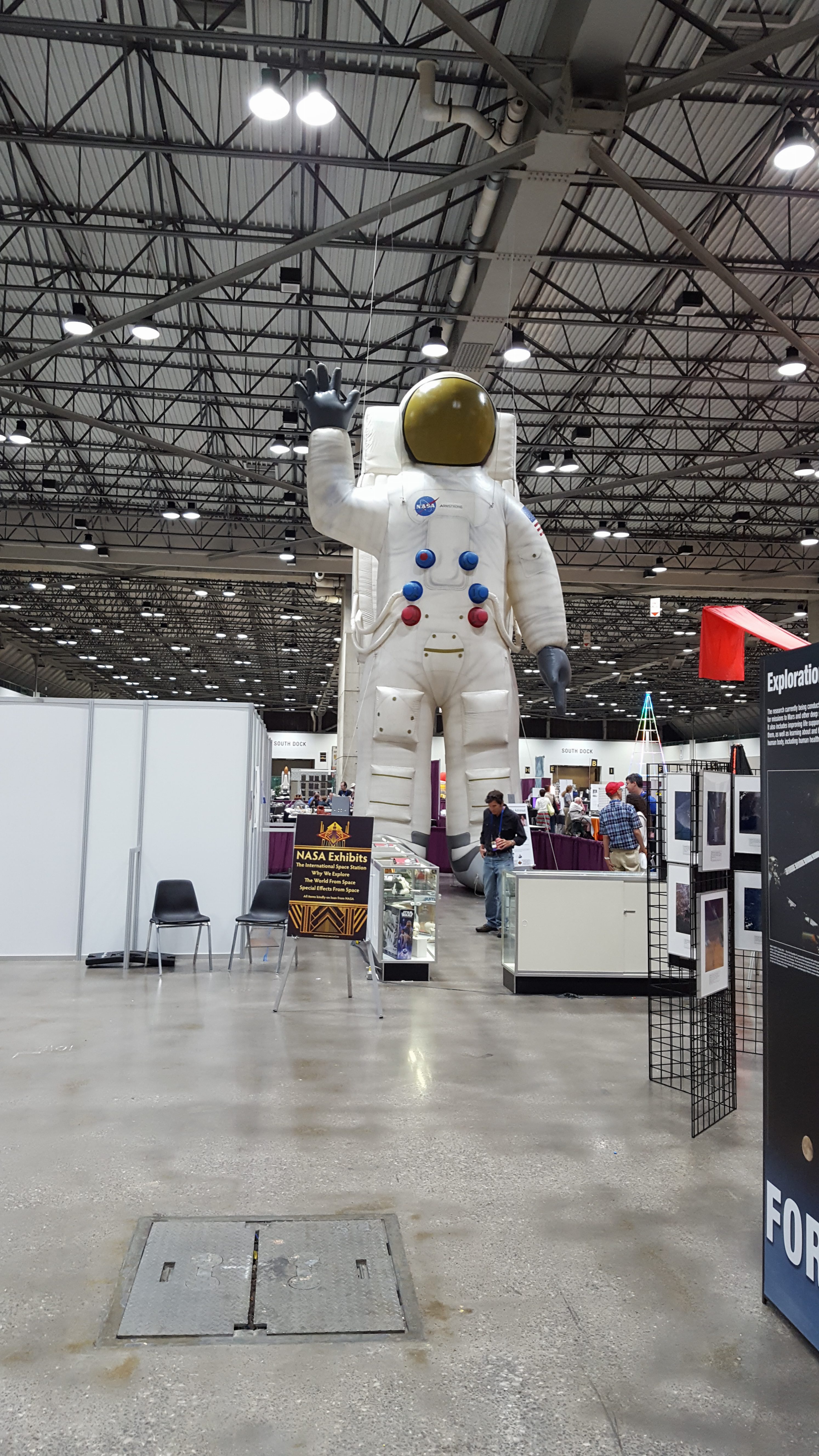
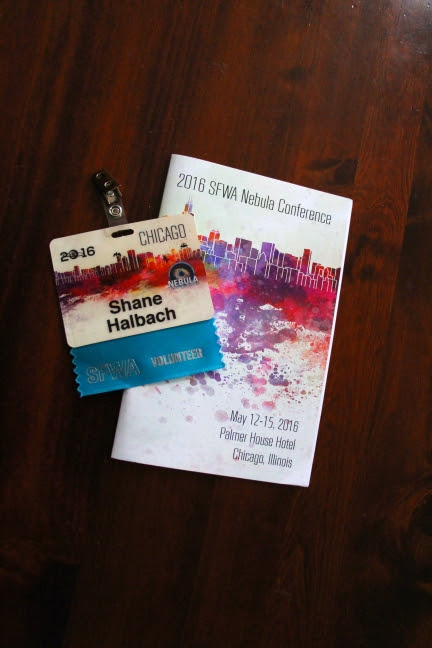
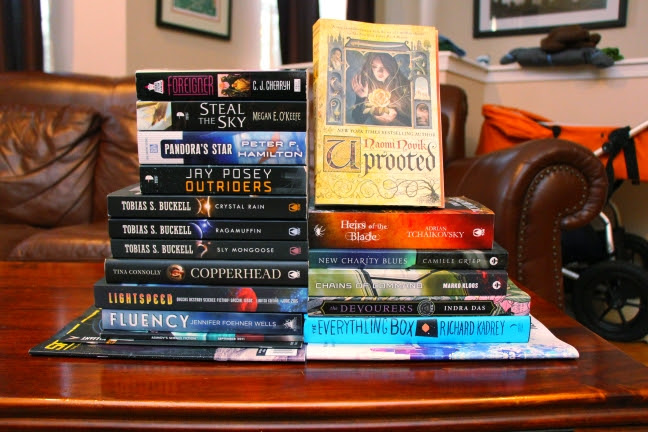
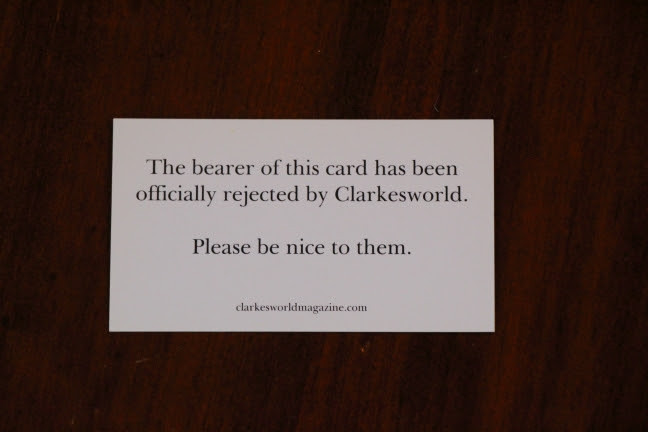

 Shane lives in a secret lair deep under Chicago with his wife and three kids, where he writes software by day and practices his maniacal laughter by night. His fiction has appeared in Analog, Escape Pod, The Year’s Best YA Speculative Fiction, and elsewhere. He plots (diabolically) at
Shane lives in a secret lair deep under Chicago with his wife and three kids, where he writes software by day and practices his maniacal laughter by night. His fiction has appeared in Analog, Escape Pod, The Year’s Best YA Speculative Fiction, and elsewhere. He plots (diabolically) at 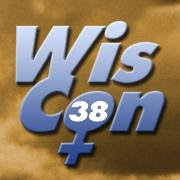
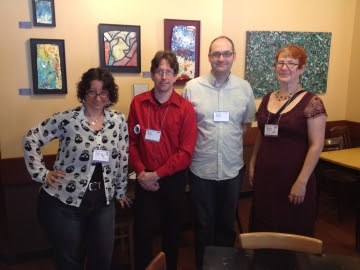

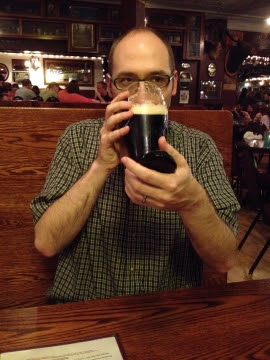
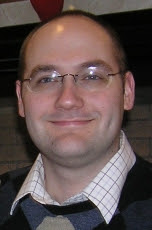
 Attending a convention with a four-year-old is a surreal experience.
Attending a convention with a four-year-old is a surreal experience.